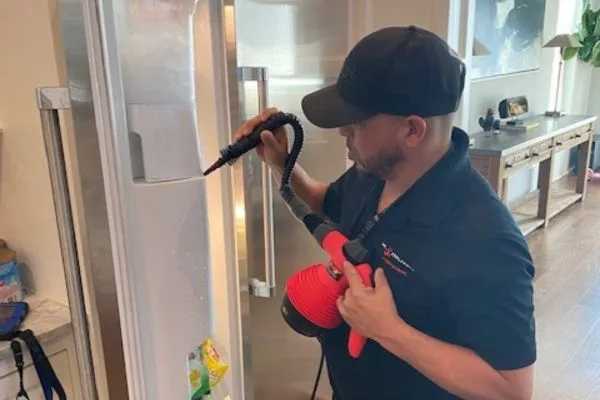Is Your Refrigerator Not Cooling? The Usual Suspects Behind A Fridge Not Cooling

You know that practical joke kids used to pull during prank calls? The one with the refrigerator? The one where the refrigerator is running, so you better go catch it? If you've been on the other end of that joke, you know that it isn't funny at all, and quite frankly, a waste of calling charges. However, if you are currently dealing with a refrigerator running but not cooling, when you contact one of our Johnson City appliance repair experts, we won't take it as a prank call. There are several probable reasons for your refrigerator not cooling, and while your fridge not cooling can be a stressful situation (especially if you've just spent a fortune on fresh foods), the situation can be easily remedied in no time.
From your own troubleshooting, you may be able to identify the reason for your refrigerator not cooling. A refrigerator running but not cooling is probably caused by frost-clogged evaporator coils or a jammed or broken evaporator fan. To effectively resolve the issue of refrigerators not cooling, it is crucial to understand the common issues that may arise with your fridge. The usual suspects are usually faulty thermostats or condenser coils covered in dust, among other potential factors. Identifying these underlying issues is the initial and vital step towards fully restoring your fridge to its optimal performance.
Think of this article as your trusty user manual for a refrigerator not cooling. Mr. Appliance of the Tri-Cities will take you through the components within your refrigerator that cause the temperature settings in your refrigerator to fluctuate, and prevent cold air circulation within your fridge. With this expert troubleshooting guide, when you receive that prank call from your niece, you'll be able to calmly say, "Yes, my refrigerator is running—quite perfectly at that." Stay tuned as we dive into the reasons behind a refrigerator not cooling.
Top Warning Signs for A Refrigerator Not Cooling
If a refrigerator is not maintaining its ideal temperature, there are several warning signs that you might observe, including:
- Food spoils rapidly, which could potentially lead to unpleasant odors.
- Food and beverage packaging often suffers from excessive condensation buildup.
- The temperature inside the refrigerator compartment is warm, more like room temperature.
If you're experiencing any of the above, this guide will be your best friend. It's important to consider the potential causes of these issues, such as a faulty thermostat or a malfunctioning compressor. Understanding the root of the problem will help you address it effectively. Now, let's look at our usual suspects.
Refrigerator Running But Not Cooling? Usual Suspects #1: Evaporator Fan and Condenser Fans
If you can hear the refrigerator compressor operating, but the refrigerator is not cooling, the most probable cause is frost buildup on the evaporator fan. Your refrigerator evaporator fan could also be stuck or broken, which emit a squeal or chirp when they're malfunctioning. If you open the freezer compartment door and the noise is loud, you've found your suspect, and the reason for your fridge not cooling. In order to maintain a proper temperature, your refrigerator requires properly functioning fan blades and properly positioned air vents for proper air circulation. In addition to your evaporator fan, the condenser fan is essential for effectively removing heat from the condenser coils.
Regularly checking the correct operation of the fan and removing any surrounding debris is crucial. If you notice any problems with your condenser fan, it may be time to consider replacing the condenser fan motor (or evaporator fan motor). A broken condenser fan can greatly hinder the cooling process and compromise your unit's ability to dissipate heat effectively. Don't wait, take action now to preserve your unit's cooling capacity.
Usual Suspect #2: Your Refrigerator Temperature Settings
For a refrigerator running but not cooling, the next course of action is to examine the internal temperatures on the temperature control panel. As you can presume, the control board is responsible for internal temperature regulation. To ensure optimal cooling, it is important to keep your refrigerator and freezer at the correct temperature. Experts widely advise setting your fridge temperature between 35 and 38 °F. It is crucial to double-check your thermostat to prevent any cooling issues due to inaccurate temperature settings.
Usual Suspect #3: Dirty Condenser Coils
Located behind or beneath your refrigerator, condenser coils get covered in dust, pet hair, and debris. Accumulation of dirt on your refrigerator’s coils can hinder the cooling process and prevent efficient heat release. To resolve this, it's recommended to use a vacuum or coil brush to clean the filthy coils. Remember to consult your product manual for specific cleaning instructions based on the model of your refrigerator.
Usual Suspect #4: The Air Vents
Having a proper air circulation is crucial for maintaining a consistent temperature inside your refrigerator. If you notice that your fridge is not cooling, it is important to check for any blockages in the air vents of both the freezer and fridge compartments. Moreover, rearranging food items inside the fridge can help optimize the airflow and make sure that the cool air vents are not obstructed. Food items obstructing air flow will lead to poor cooling and poor performance. This simple step can greatly enhance the even distribution of cold air throughout your kitchen appliance.
Usual Suspect #5: The Door Seals
The rubber gasket seals on your refrigerator doors play a crucial role as protectors of cold air. Broken gasket seals, cracked, leaking, or compromised, will allow cold air to escape, causing your refrigerator to work overtime to stay cool. It is essential to inspect the gasket seals regularly for any signs of wear, tear, or gaps. If any issues are found, it is important to promptly replace the gasket seals to ensure a secure closure, ultimately leading to better cooling. Regular maintenance of the door seals can prevent energy wastage and also save you money on your electricity bill. Additionally, ensuring a proper seal will help keep your food fresh and extend the lifespan of your refrigerator.
Usual Suspect #6: Faulty Compressor
The fridge compressor is like the mitochondria, providing power to the entire refrigerator system. If you have compressor issues, it can result in issues such as inconsistent cooling and loud noises emanating from your refrigerator. Be vigilant and take note of any unusual sounds like clicking or humming, as they could indicate a problem with the compressor. If you suspect any issues with the compressor fan or circuit, we highly recommend seeking professional repairs from Mr. Appliance. We possess the expertise to accurately diagnose compressor problems and deliver the necessary professional services, guaranteeing the optimal performance of your refrigerator.
Usual Suspect #7: Is Your Refrigerator Level?
Ensuring that your refrigerator is properly leveled is crucial for the best performance. To check for proper installation, simply place a level on the floor underneath the appliance to ensure it's on a flat, even surface. If it's not level, you can use shims to adjust it. For detailed leveling instructions, check your product manual where it should have outlined its proper installation and leveling process. If you no longer have the manual, you can often find it online by searching for the make and model of your refrigerator. Furthermore, a tilted refrigerator can lead to uneven cooling, potentially affecting the freshness and shelf life of your food. So, taking the time to level your refrigerator can help maintain its efficiency and keep your groceries in the best condition possible.
Usual Suspect #8: Food Arrangement
If you have a large household with children who do not pay attention to where they put things, the items in your refrigerator may be taking up too much space, which can prevent the air from circulating properly. For your refrigerator not cooling, try to prevent this by decluttering, organizing, and using containers or Ziploc bags to create a few inches of space. By making these simple adjustments, you can enhance the circulation of air, eliminate ice buildup, and ensure that your refrigerator remains at a consistently cool temperature. Moreover, regularly inspecting the expiration dates and promptly discarding any expired or spoiled items will contribute to the freshness of your fridge, effectively reducing the chances of foodborne illnesses. Additionally, giving due importance to appropriate storage practices, like keeping raw meats separate from ready-to-eat foods, will play a crucial role in preserving the quality and safety of your food.
Keep Your Refrigerator Cool by Relying On Mr. Appliance for Refrigerator Repair
A refrigerator not cooling is an extremely puzzling scenario, but that doesn't mean it doesn't happen to all of us at least one time in our lives. While our modern appliances are incredible, they are not invincible. Certain factors like broken gasket seals, compressors, and evaporator fan motors can lead to a refrigerator running but not cooling. If reading these troubleshooting tips were just a waste of time and still your refrigerator isn't cooling, contact our excellent customer service team today at Mr. Appliance of The Tri-Cities to schedule a refrigerator repair with one of our appliance experts. From there, one of our appliance repair professionals will be able to identify the source of the problem, and potentially order new parts for your fridge to have it up and running in normal condition once again.
 Click to call
Click to call


